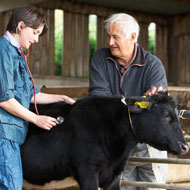Prime Minister announces £7 billion food growth plan

By summer 2016, farmers will only have to deal with one Single Farm Inspection Taskforce.
David Cameron has announced a series of proposals to 'cut red tape' for British farmers, including 20,000 fewer farm inspections and a new single Farm Inspection Taskforce.
The Prime Minister introduced his plans to boost productivity and grow food and farming during a visit to the Royal Welsh Show in Powys.
Under existing inspection regimes, seven regulators carry out over 125,000 farm inspections every year to England's 250,000 farms. The government say that streamlining the process and making better use of the technology and data, will radically reduce the number of inspections.
By summer 2016, farmers will only have to deal with one Single Farm Inspection Taskforce, which will combine farm visits with mandatory checks. The Task Force will use the latest technology to streamline the approach to inspections - for example, using satellite data to analyse different crop types in fields.
It is hoped that the changes will create over £7 billion worth of new opportunities to grow food and drink exports from the whole of the UK, to countries outside of the EU. This would create more rural jobs, bringing greater investment to local communities and grow Britain's economy.
In a statement David Cameron said: "I am very pleased to be at the Royal Welsh Show today to see the best in livestock, food and drink Wales has to offer.
"Farming and food production are a fundamental part of our rural economy. As a one nation government, we will keep on backing British farmers to grow and sell more home-grown food by liberating them from red tape and opening up new multi-million pound export markets.
"I hope that the Welsh government also looks to do more to simplify inspections to benefit the industry and rural communities."
Other proposals announced by the Prime Minister include increasing Protected Food Names - such as Carmarthen Ham and Welsh Laverbread - and the creation of a new UK-wide Food Innovation Network.



 The veterinary mental health charity Vetlife is inviting the veterinary community to join it for a sponsored cold-water dip.
The veterinary mental health charity Vetlife is inviting the veterinary community to join it for a sponsored cold-water dip.